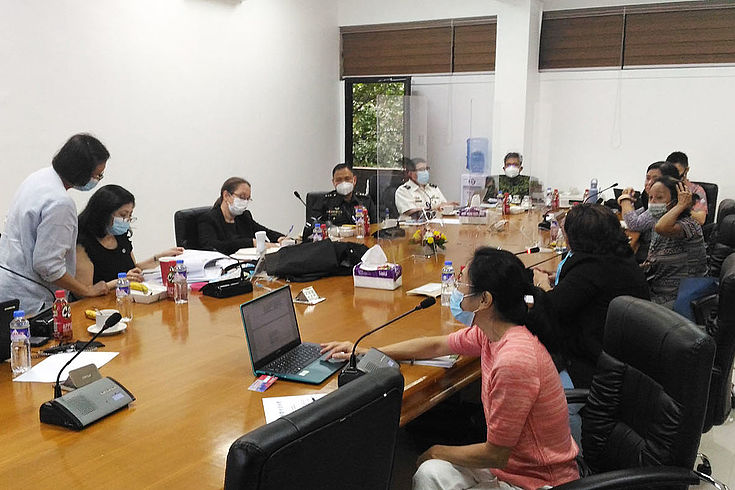On Community-based Dialogue (CBD) project
CBD PSC holds Strategizing Session
The agenda covered the following: (i) CBD Annual Assessment and Planning; (ii) discussion on the UN HR Council Resolution; (iii) mapping of new/existing laws, policies and mechanisms since the “La Breza” Declaration on Human Rights Cooperation was signed in 2012 among the CHR, AFP and PNP; and (iv) review of the “La Breza” Declaration in light of the current context.

Strategizing session of the Project Steering Committee of the Community-based Dialogue (CBD) project
HSF
A presentation of the 2020 CBD accomplishments was shared by Maria Adelia Co, HSF Program Coordinator. Mr. Rene Clemente, ALG Program Officer led the discussions on identified gaps and challenges, and plans for 2021 towards institutionalization of the CBD. The new AFP HRO Chief, Col. Joel Alejandro S. Nacnac and PNP HRAO Acting Chief, Col. Vincent S. Calanoga described their respective organization’s roles/mandate in the promotion and protection of human rights.
Ms. Signe Poulsen, representative from the Office of the High Commissioner on Human Rights (OHCHR) was invited to discuss the UN Human Rights Council Resolution on “Technical cooperation and capacity-building for the promotion and protection of human rights in the Philippines” in cooperation with key agencies of the government. Ms. Rosemarie Trajano, Secretary-General of PAHRA inquired how other agencies/CSOs will be involved aside from key government agencies already identified. CHR Commissioner Karen Dumpit informed Ms. Signe that the CBD is already institutionalized at the CHR with regular dialogue activities conducted in all regions with annual budget allocations and/or supplemented by funding from HSF. She noted that the longstanding cooperation, which is running on its 12th year, is unique in the sense that there is the willingness of partners, in particular the CSOs and security sector, to engage/talk/resolve problems/issues between them. It was mentioned that the CHR is the CBD lead convenor in the regions assisted by CSOs as co-convenor, and acts as a bridge between CSOs and security sector to strengthen the partnership and finding ways of convergence. Ms. Signe signified that the technical cooperation project would like to add value to existing programs and projects, and may work together with the CBD as an adviser and platform for dialogue/sharing experiences to address the gaps.
For the identification of plans for 2021, Atty. Sheila Formento, National Coordinator of the ALG facilitated the activity. Initial inputs include strengthening the core groups/networks at the grassroots level through regular dialogues, capacity-building, top-/regional-level policy dialogues, feedback and referral mechanism, among others.
Thereafter, the initial mapping of new/existing laws, policies and mechanisms was presented to the group for additional inputs and discussion spearheaded by Commissioner Dumpit. Com. Dumpit suggested to further enhance the document for completeness in terms of type of document, branch of government/agency it belongs to, actors/stakeholders, among others. Finally, the group reviewed the “La Breza” Declaration (expiration period of 3 years) point by point to assess its significance in light of past and present developments, and decide later on whether to come up with an updated version or pursue a new cooperation agreement altogether.
